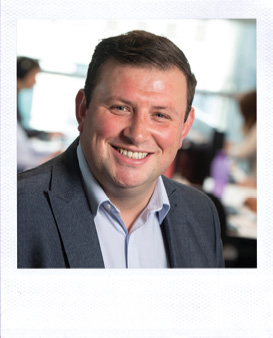In 2022, as we emerged from COVID there were fresh challenges for FMs, including inflation, rising energy prices, managing hybrid working practices and dealing with skills shortages. How do you think the sector has adapted to the challenges this year and what do you predict are the main issues to watch out for next year?
 THE RICS PROFESSIONAL’S VIEW
THE RICS PROFESSIONAL’S VIEWPAUL BAGUST,
HEAD OF PROPERTY STANDARDS, RICS
“We are what we repeatedly do. Excellence is not an act, but a habit” Aristotle.
In periods of great change and challenge people will look to professionals to provide assurance and solutions. If these are not forthcoming, they may also look to professions to apportion blame. This is certainly one of those times.
As we look back it is clear the FM industry has worked under unprecedented pressure since March 2020. During this time, we have seen a tremendous response from the profession in terms of keeping critical infrastructure open and safe and managing the return to work. As we now enter a period of economic, social and environmental challenge the FM industry once more must step up to be the profession that provides this assurance and develops solutions.
In the past three years there has been an increased recognition from all sides of the industry whether it be investors or occupiers of the crucial role that FM professionals play. With most organisations now wrestling with often seemingly competing and challenging issues there is an opportunity to really take ownership of the strategic space in terms of building operation and performance.
As we see organisations looking to review how much space they occupy, how they manage the complexities of an ESG agenda, how to encourage staff to return to work and how to create an efficient and high performing workplace in the context of a looming global recession we can see the scale of the challenge.
In the past year at RICS I have been talking to FM professionals all around the world about the new RICS International Building Operation Standard www.rics.org/ibos (IBOS). IBOS sets out the need to create high performing buildings for all and that this performance must be measured to create transparency and clarity around long term planning.
Central to this is of course data. IBOS states that we must be able to measure traditional FM activity such as function, cost and compliance and also reflect sustainability and performance as part of a more holistic view.
It has been a great privilege to talk to so many firms to really see the innovation, collaboration and value that is being driven by the sector and the recognition that FM must avoid returning to the days where is was only seen as a commoditised cost for a business rather than a driver of value.
As a professional body, RICS must continue to work closely with industry to ensure the ever changing skill set of FM is recognised in our pathways and qualifications to ensure we attract the very best talent into our sector.
Managing this complex relationship between cost and value and using data and technology is where I see FM developing in the coming period. All organisations whether they be offices, schools, retail or other critical buildings will be asking complex questions relating to how their buildings support their wider objectives on reducing carbon or increasing performance. Increasingly, it will be the FM profession to which they turn for these answers.
It is clear that all sectors are facing a difficult period economically and FM has certain unique challenges in terms of recruitment of staff, but the commitment to service and performance has never been greater.
It is professionals that will support organisations at this time and professionals that will be able to resolve some of the most complex challenges that have ever been faced.
FM is at the heart of the issues like never before. The ability to provide and deliver solutions and capture data to measure those outcomes is essential in 2023. As Gandhi said, “the future depends on what you do today”.
 THE FM PRACTITIONER AND FMJ EDITORIAL COMMITTEE MEMBER’S VIEW
THE FM PRACTITIONER AND FMJ EDITORIAL COMMITTEE MEMBER’S VIEW
WAYNE YOUNG,
FACILITIES MANAGER, JUST EAT TAKEAWAY.COM
I think the reason why so many people begin and stay in FM is the diversity of the job, and for this reason it is why I think as an industry no matter what challenges are laid down we accept, overcome and flourish.
There is no doubt that 2022 has been a year of challenges, like many of the year’s prior. We started the year looking at how we would manage a changed workplace, where hybrid working was the norm; and how we were going to deal with huge skill shortages and labour challenges. As the year progressed our focus moved to how to manage the financial impact of inflation and rising energy prices. Many businesses again turned towards their Property/FM teams to help steer a path.
So what does 2023 look like? Like much of 2022, I truly believe that cost is going to be our biggest challenge. We know that costs are going up, with increases in materials, fuel, food, business rates and pay. It is predicted that the country will enter a recession. It all sounds very glum, but it’s another opportunity for us as an industry to show our worth and value to business. Again, this is where (like the year’s previously) we step out of the shadows and offer clear value to our businesses.
My focus points through 2023 will be in making sure my buildings and environments are effective and efficient, thus ensuring that the cost of facilities is maximised for the business. Firstly I will be focusing on space utilisation, looking at what our space is used for, maximising our sq ft and looking for alternative uses for space we don’t need. We’ll make the space we do use an environment where people want to be, so as to attract our people and talent to use these spaces more often (we all relish the opportunity to collaborate face-to-face).
Secondly – I will focus on energy efficiency, only lighting and heating the spaces that will be used by utilising some of the great smart building technology. For example, we charge a lot of batteries and if we can do this at better times of the day we can make some significant savings in our utilities bills.
I see 2023 as an opportunity for new technologies to develop and emerge and the chance for FM professionals to show our value to board room. We have traditionally been seen as a cost, here again is our chance to demonstrate our value with our skills and initiatives that will help organisations deal with the financial impact of 2023.





